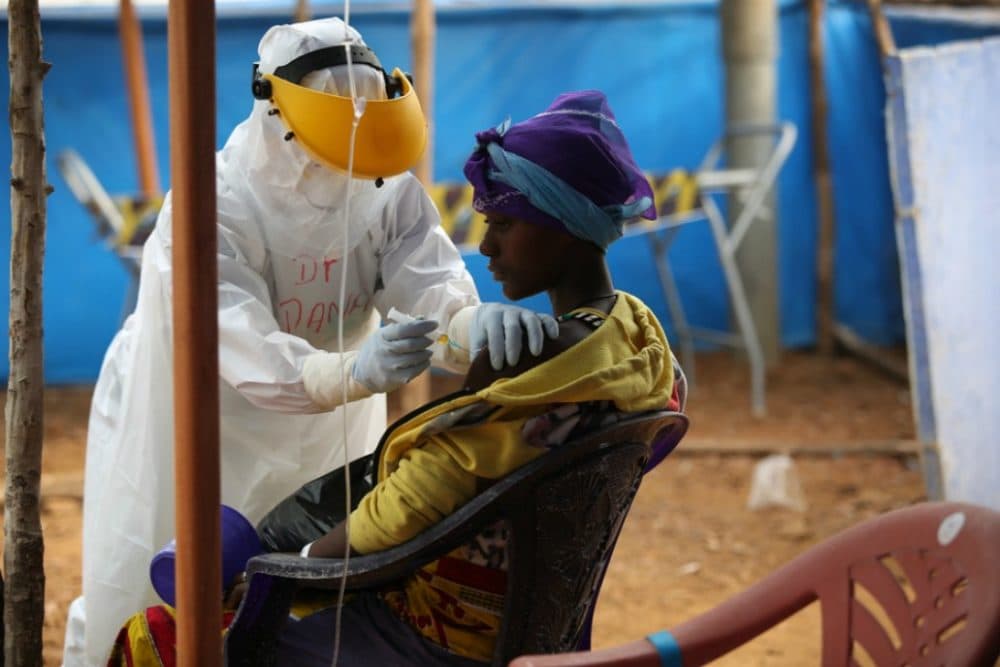Advertisement
Commentary
The Coronavirus And The Poor: Lessons From Ebola

The smell of chlorine is never far from my mind. It left an indelible mark on me during the Ebola epidemic of 2014 in West Africa.
Chlorine was a friend, doused over my hands before entering any building, soaking into my shoes in a bath outside facilities where Ebola patients were isolated, and sprayed over my body every time I exited one of the dozen Ebola treatment units I was responsible for in the early days of the Partners In Health Ebola response.
These stubborn smells of a deadly epidemic linger until the next epidemic strikes, which is when one shakes the strange nostalgia, snaps upright and sets off in hopes of lessening the misery caused by another mysterious virus.
Another indelible mark is a lesson learned early in the Ebola epidemic: The poor of our world will suffer — whether from Ebola or now, COVID-19 — far more severely than most of us can imagine.
Currently, the most underserved country in our hemisphere — Haiti, with a population of 11 million people — has the capacity to provide mechanical ventilation to fewer than 70 patients across the entire country. Mechanical ventilation is the only hope for the most severe cases of the new coronavirus. For context, there are single hospitals in Boston routinely providing mechanical ventilation for at least 70 patients as I write.
Another indelible mark is a lesson learned early in the Ebola epidemic: The poor of our world will suffer ...
Haiti strengthened its critical care capacity in the midst of another crisis — the devastating earthquake of 2010 — but we have failed to amplify that new capacity around the entire nation and more ubiquitously around the world.
Our confrontation with a global pandemic like the one we are facing should always drive conversations about a health-care system’s capacity to provide critical care and ventilation for the most severe cases. But such a crisis should also be a moment to reflect on the great disparities that exist in global health and force us to ask why past crises have not generated more growth in sustaining the push for health equity everywhere.
Today, these inequities will generate case fatalities from the new coronavirus out of proportion with what we are experiencing in wealthy countries. It is worth noting that no American citizen who was evacuated back to the U.S. during the 2014 Ebola epidemic died from the virus. Could the mere location of care be a cure?
It was not until Ebola made its way across America's borders in August of 2014 that our nation stepped up to combat the epidemic, despite months of calls for a global response from Doctors Without Borders.
It is no coincidence that the U.S. administration mounted an initial, tepid response only after the financial markets faltered and the threat became economic. More recently, the Trump administration decided to disband an office within the National Security Council, created after the Ebola epidemic and designed specifically to confront the global threat from emerging pathogens.
Advertisement
Could the mere location of care be a cure?
It seems we continue to relearn the same lessons again and again in the face of an ever-smaller world.
Despite the fight to prevent geography from dictating health outcomes, our focus does not have to lie only in faraway places. Poverty exists in close proximity and wields a horrific influence upon all those who suffer from it.
As we consider the collective, and appropriate, sacrifices necessary to stem the transmission of any epidemic and "flatten the curve," we must also know that many of the poor cannot so simply work from home. A child’s only hot meal for the day might come from their school. Some staffers' only income is generated by working on the frontline of the epidemic.
Yet preventing the pathogenic situation of poverty, which only fuels such epidemics, would be far more fruitful (and less expensive) than negotiating the economic stimulus required to address the impacts we will inevitably experience.
Such a pandemic is not the moment to agree on the necessity of Medicare For All or emergency enactment of universal basic income. But these are the basic human rights that should form the foundation from which a public health response must be built.
The 2014 Ebola epidemic has sometimes been dubbed a global wake-up call to the threat of emerging pathogens, but rarely have we noted the burden of such dreadful epidemics on the poor. Indeed, 70% of Ebola transmission in Liberia’s capital was traced to the poorest neighborhood in the city.
While coronavirus transmission in Haiti or Liberia is just beginning, many of us brace for the inevitability of the virus reaching these places we hold so dear, places where we fight endlessly to bring the fruits of modern medicine to the people who need it most, and places where a federal stimulus package will be of little use.
We must acknowledge that caring for one another in an equitable fashion, everywhere in the world, behooves the whole of society. Other than being the morally right thing to do, striving for the good health of the poorest in our society will inevitably boost the health indices of our entire world.
I have learned from my Ebola days that I will not be able to list “lack of a social safety net” on COVID-19 death certificates for the poorest amongst us — an astute point Dr. Paul Farmer described during his early days caring for tuberculosis patients in Haiti (and Boston). But the smell of chlorine still stings my nose, and these lessons can never be unlearned.
John C. Welch is a Doctor of Nursing Practice and Senior Nurse Anesthetist at Boston Children’s Hospital. He is the Global Anesthesia & Perioperative Advisor for Partners In Health and helped lead their early Ebola response in West Africa in 2014. The views expressed here are his alone.